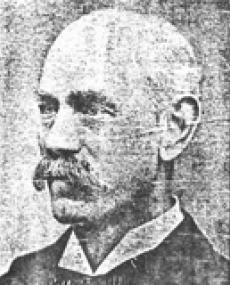
Chairman of the Natives Land Commission, member of the, South African National Party and Judge at the Natal Supreme Court.
William Henry Beaumont was born in India on 24 February 1851. His father was a Lieutenant Colonel of the 23rd Madras Light Infantry. Beaumont attended Sherbourne and Sandhurst Military College and after completing his studies joined the 75th (Stirlingshire) Regiment. He was commissioned to the rank of Ensign in 1870 and promoted to Lieutenant in 1871. Later that year he arrived in Natal with his regiment. In 1873 he served as a private secretary to the Administrator of Natal, Lt. Col. Thomas Milles. That same year Beaumont became the clerk for the Executive Council and also accompanied the Langalibalele expedition. In 1874 William served as acting magistrate for the uMlazi division, as well as sitting in on the Commission to report on the Civil Service in Pietermaritzburg. However, it was not until 1878 that William began his judicial career in earnest serving as magistrate for the Newcastle division.
He left the army in 1875 and briefly went to Ireland before returning to Natal to take up a position as the clerk to the Governor's office and the Executive Council. During the Anglo-Zulu War Beaumont served as District Commandant of the Division of Klip River, and was in charge of an African contingent and a corps of mounted of mounted infantry to defend the border. He was subsequently decorated and thanked for his efforts during the war in January 1879. Around this period he was also leader of the United Rifle Association in Pietermaritzburg.
In 1882 Beaumont was appointed to the Sub-Commission in charge of settling claims for compensation after the war. He conducted an investigation into the Umsinga Magistracy in 1884 and the Stanger Magistracy in 1890. That same year he sat on the board of Magistrate Court Rules, followed by the Board to frame Rules and Regulations for the Inferior Courts in 1894. As a result of his work in justice system Beaumont was added as an Advocate of the Supreme Court in 1894, and two years later (1898) acted as a Puisne Judge. His work particularly in the 1890s spanned to other spheres serving on various boards such as the Board to frame Rules and Regulations for Licensing Board in 1896, the Civil Service Board also in 1896 and the Board of Inquiry into Grievances of Railway Employees three years later in 1909.
During the South African War Beaumont was a leader of the United Rifle Association in Pietermaritzburg and arranged for the training and organisation of 1 000 men for defence and was once again thanked and awarded on 25 June 1900. He was also commended for organising the Pietermaritzburg Reserves under the Militia Act. In 1902 he was appointed as a judge for the Natal Supreme Court. He gave testimony before the South African Native Affairs Commission chaired by Godfrey Lagden (subsequently know as the Lagden Commission) in May 1904. When asked whether the amount of land the Africans had was satisfactory, he replied,’ if they began agricultural farming instead of simply subsistence farming it would be.’
William was appointed to hold an inquiry into charges made by the Bishop of Zululand against Royston’s Horse in connection with the shooting of five African people in 1906. The Bishop alleged that soldiers under Col. Royston shot and killed five African people in cold blood while Royston claimed those who were shot were prisoners trying to escape and therefore the shooting was justified. The following year in 1907, Beaumont was acted as Administrator of Natal. On 11 February, 1907, he was commended for having organized the Pietermaritzburg Reserves under the Militia Act. William also performed duties as acting chief justice and magistrate of Natal in 1909.
After the formation of the Union of South Africa, Beaumont became part of the Delimitation Commission to delimit the electoral constituencies of the first union parliament. He retired from bench in 1910 but still remained in prominent in public affairs matters and was an ardent supporter of General Botha. When Botha contested the 1910 elections, he had done so without forming a nationwide political party to placate English-speaking South Africans. After winning the elections Botha worked on forming a political party and looked to Natal for support. Beaumont became active in canvassing support for Botha arguing that Botha would be able to close the divide between English and Afrikaans speaking South Africans. He became one of the representatives from Natal to be invited to attend the Congress in Bloemfontein which resulted in the formation of the South African National Party (SANP).
During the Congress in Bloemfontein Beaumont was elected to a Sub-Committee tasked with drafting the South African Nationalist Party’s constitution. After the Congress he became chairman of a provisional committee which was established by the party in Natal. In September 1912 he presided over a meeting that resulted in the formation of two branches of the SANP in, one for Pietermaritzburg North and other for Pietermaritzburg South. A few days later he addressed the electorate in the Umvoti Country Division on issues related to the constitution of the party. He also played a major role in the formation of the party in Durban in 1913.
Beaumont was appointed as chairman of the Natives Land Commission (which subsequently became known as the Beaumont Commission) by General Botha. The commission was tasked with finding land and defining boundaries for territorial segregation between black and white people. In March 1916 the Commission submitted its report outlining boundaries and recommending which areas were to be allocated to white people and which ones were to be allocated to black people.
William Beaumont died c.1930.